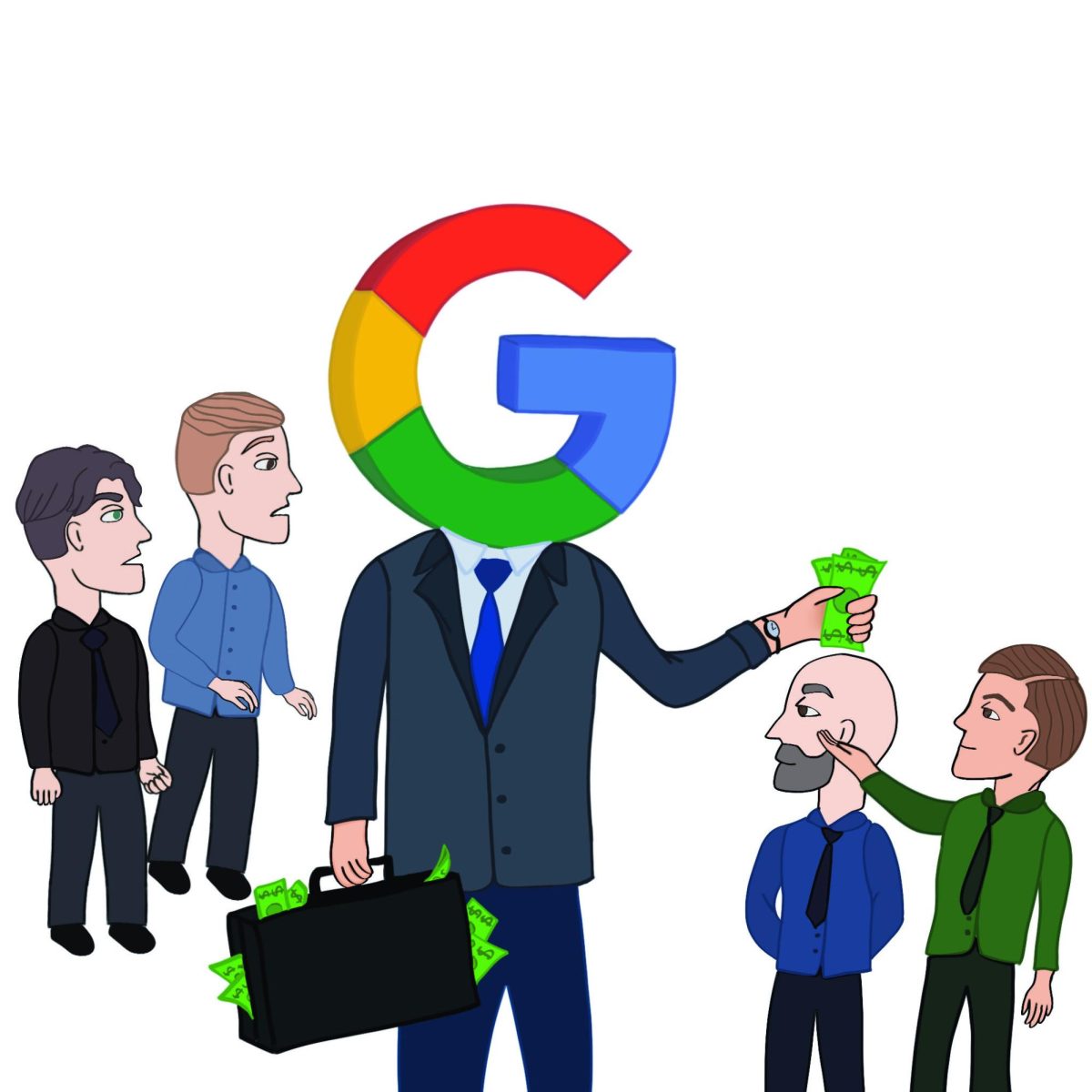A civil antitrust lawsuit filed by the Department of Justice accuses Google of monopolizing the search and search advertising business.
The trial, which started on Sept. 12 in Virginia, alleges that Google illegally neutralized or eliminated competitors through various acquisitions, harming competition and consumers.
According to a press release by the Justice Department along with various state attorneys general, Google has been paying billions of dollars to internet browser companies and phone manufacturers such as Apple and Samsung to make itself the default search engine, making it difficult for other search engine companies to compete.
Economics teacher Eric Bloom said the existence of big corporations such as Google potentially drives out smaller tech companies.
He also said antitrust laws in the United States are meant to prevent large firms from stifling innovation by selling mediocre ideas.
“This area and tech has become so innovative — (it) hasn’t been big, gigantic companies that have come up with these great new ideas,” Bloom said. “It’s smaller companies that are running sort of tiny segments, and they’re trying to emerge into a larger market.”
Senior Spencer Wu-Chin said he thinks being a default search engine could give Google many advantages and decrease the benefits of a free market.
“People just use Google because it’s the default on everything, and so it’s not necessarily better, (people) just end up using it because it’s there,” Wu-Chin said. “(In a) free market, people come up with more innovative ideas and fill people’s needs. Instead, you’re just having one company that automatically services everyone, and then they don’t have to make things better in order to keep customers or attract them.”
AP Computer Science teacher Roxanne Lanzot, though, said many people may choose Google as their default search engine because Google is better.
“From my own personal experience, having used many search engines since the internet was kind of born for consumers, I always come back to Google,” Lanzot said. “I think they do everything better.”
Freshman Melody Xu said she thinks Google has a monopoly over search engines because it has become an integral part of people’s everyday lives.
“I would walk around in the hallway, or I’ll ask my friends a question, and they would say, ‘Oh, just Google it,’ so I think it’s definitely become a day-to-day (phrase),” Xu said. “You’d never say, ‘I’ll Bing it’ or ‘I’ll Microsoft Edge it,’ but you always say, ‘I’ll Google it.’”
Bloom said while it is not illegal for Google to create quality products, it is illegal – based on the Sherman Antitrust Act – for it to manipulate the market using its dominance. Examples of market manipulation include artificially price gouging competitors into bankruptcy.
Wu-Chin agreed and said it isn’t possible to spur innovation under a monopoly, which is why he thinks it is good for the government to step into business affairs in a situation like this.
“Even if you’re a really a big fan of the free market, the freest market still needs the government to make sure that the market can be an equal opportunity place for everyone with good ideas to develop companies instead of having just one company create hegemony over all the other ones,” Wu-Chin said.
Career Technical Education Instructional Lead Christopher Bell said while Google has competitors in the search advertising market, it holds over 90% of the global search engine market share, making it difficult for advertisers to find alternatives.
“If I’m a company that’s looking to advertise, I’m almost forced to go to Google if I want to make the best out of my money,” Bell said. “In those cases, they have kind of a de facto monopoly.”
While Lanzot agrees that one corporation running an entire industry can be problematic, she said she relies on Google’s products so much that she has a difficult time pulling her personal feelings away from the rational argument about whether Google has a monopoly.
“I’m a little scared about this case because I’m kind of fearful that if the Department of Justice wins, what that will mean for my own use case, and if it’s going to make it difficult for me to access the tools that I depend on in my life and in my work,” Lanzot said.
Regardless of the outcome, Bell said he thinks this trial will affect other major tech companies in addition to future antitrust cases.
“If they find that Google has done something wrong here, and put sanctions or even break up pieces of Google, it can have a big effect on all the other major tech companies like Amazon and Facebook,” Bell said. “(These companies) buy up other technologies to help their platform grow and in some cases, they might even buy up other technologies to make sure someone else doesn’t get it and grow.”
And Bell said the judge in this case will have to define at what point wanting to be better than competitors turns into monopolistic behavior.
“When someone has dominated a market to a certain degree, everybody uses it because they’re better, and so they have an incentive to stay being the best,” Bell said. “They’re going to do everything they can to make their product the best that it can be, and better than any competitor that could enter the space.”
Plus Bell said it’s hard to completely get away from Google because it has basically eradicated every other search, becoming the primary search engine for a majority of the population.
“I’ll probably continue to use Google regardless of the outcome of the case whether they were good or bad, just because it’s hard to ignore them at this point,” Bell said. “But if someone else came up and did something better, I’m happy to switch. I’ve got no loyalty other than having the best product for the consumer.”




